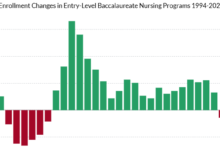New standard sets ‘unified approach’ to nurse notes

New guidelines that aim to standardise nursing documentation across hospital, community and social care settings have been published, and could become a mandatory part of practice in the future.
The draft Nursing Care Needs Standard has been created by the Professional Record Standards Body (PRSB), in a project commissioned by NHS England.
The PRSB said it hoped the standard would improve continuity of care between healthcare settings and reduce the amount of time nurses had to spend on admin.
“A unified approach to nursing practice across care ensures consistency and amplifies the patient voice in their own care journey”
Helen Balsdon
It sets expectations for what information from a patient, on first contact with nurses, must be taken, relating to eating, drinking, mobility, toileting and continence, personal hygiene, dressing, skin integrity and medication management.
The documentation, which is intended for use in hospitals, community health services and nursing homes, will describe the patient’s quality of life, any underlying conditions they have, and how their quality of life can be improved.
The standard then sets the expectation that this completed documentation will be digitally stored and shareable between different care providers that have contact with the patient – such as a hospital and a nearby care home.
This, the PRSB said, would prevent patients needing to repeat information and reduce the number of nursing staff hours used on filling in and finding documentation. It also said the standard would improve continuity of care between the NHS and social care.

Helen Balsdon
Interim chief nursing information officer (CNIO) for NHS England, Helen Balsdon, who helped develop the new standard, said its publication was a step towards “a seamless care experience” for patients.
She said: “A unified approach to nursing practice across care ensures consistency and amplifies the patient voice in their own care journey.”
The Nursing Care Needs Standard does not cover treatment plans used by advanced nurse practitioners, or midwifery, neonatal care or mental health nursing.
Currently, the standard is not mandated – but it may be in the near future.
The standard is in draft form while the PRSB seeks endorsement from organisations including the Royal College of Nursing.
An Information Standards Notice (ISN) will then be sought to give healthcare providers a statutory duty to use it.
“It’s crucial that we support nurses’ work as much as possible”
Maureen Baker
Professor Maureen Baker, PRSB chair, said: “Nursing is fundamental to delivering high quality care whether in hospital, or the community, and so it’s crucial that we support nurses’ work as much as possible.
“To do this, it is key that we recognise the administrative burden of documenting and sharing care information on nurses and provide them with solutions that make their working lives easier, more efficient and rewarding.
“The PRSB’s Nursing Care Needs Standard will help nurses have the information they need at their fingertips, enabling them to make informed decisions and deliver timely and safe care.”
The standard has been informed by a survey completed by more than 400 nurses and midwives.
The survey described the aim of project as being “to improve the quality and consistency of nursing documentation, while also ensuring that the needs of patients and healthcare providers are met”.
It added: “It is a chance to determine what information needs to be shared among professionals to make sure that they can offer the highest quality of care possible.”

An example of a form filled in adhering to the new Nursing Care Needs Standard, using the hypothetical case of a child being admitted with a fracture.




